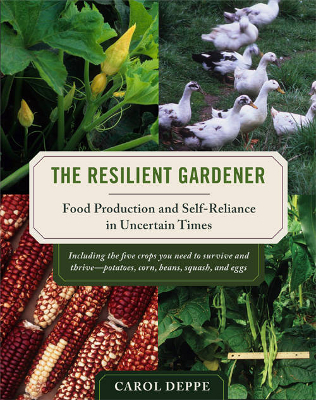
The Resilient Gardener
 I've had Carol Deppe's The Resilient Gardener
on my shelf for a couple of years, but only read it from cover to cover
this spring. Why the wait? I'm ashamed to say that part of
my foot-dragging was due to an assumption that the book was very dry
since the only photos are in a central insert. Despite lack of
images in the text, though, the book is very engagingly written.
I've had Carol Deppe's The Resilient Gardener
on my shelf for a couple of years, but only read it from cover to cover
this spring. Why the wait? I'm ashamed to say that part of
my foot-dragging was due to an assumption that the book was very dry
since the only photos are in a central insert. Despite lack of
images in the text, though, the book is very engagingly written.
A more important issue is
that Deppe and I have very different gardening and dietary habits, so
much of her information isn't relevant to me. In many ways, she
follows the gardening advice of Steve Solomon,
which is probably a great way to grow in the Pacific Northwest, but
doesn't suit our farm or palates. On the other hand, it might suit
many of you better than it did me --- the information is definitely
well-researched and is based on personal experience, which is what I
always look for in a homesteading book.
With all of those caveats, what finally got me to crack the cover? Now that we're going to try ducks
(arriving this Friday!), I figured I should go straight to the source
and learn from an expert. Stay tuned for helpful hints on ducks
and more in this week's lunchtime series.
| This post is part of our The Resilient Gardener lunchtime series.
Read all of the entries: |
Want more in-depth information? Browse through our books.
Or explore more posts by date or by subject.
About us: Anna Hess and Mark Hamilton spent over a decade living self-sufficiently in the mountains of Virginia before moving north to start over from scratch in the foothills of Ohio. They've experimented with permaculture, no-till gardening, trailersteading, home-based microbusinesses and much more, writing about their adventures in both blogs and books.
Want to be notified when new comments are posted on this page? Click on the RSS button after you add a comment to subscribe to the comment feed, or simply check the box beside "email replies to me" while writing your comment.

Hi Anna and all,
Carol's first book really inspired me !!!!
I eventually ordered some of her seeds and got to know here via e-mail.
Last year I grew her Homesteader Squash.
One of those squash was high enough Brix that on is still sitting in the heated kitchen with no signs of getting older. So it seems to be true that: "High Brix produce does not rot."
The squash looks like the Am. Indian storage squash I have read about???
Anyways, good to see her name on this site.
I am anxiously awaiting news about captured swarms :).
John
Carol Deppe is a Harvard PhD in biology. While she may have adopted much of her system ala Solomon style I think that is determined more by where she is growing food than anything else.
She used to be a professor locally and our growing conditions are radically different from her current growing conditions and I have recollections of her advising differently back when she was local.
Her other book, Breed your own vegetable varieties, while much older is also highly recommended and very useful as she covers genetics from the standpoint of a small householder or farmer breeding a localized variety.